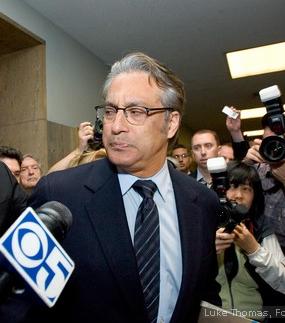The drama that hordes of reporters were waiting for didn’t happen. District Attorney George Gascon’s threat to “bring up” at Sheriff Ross Mirkarimi’s sentencing the notion that Mirkarimi didn’t really think he was guilty vanished. Mirkarimi sat in front of Judge James Collins, who years ago helped a sitting judge duck a domestic violence charge, and agreed to the terms of his sentence (three years probation, mandatory attendance at a 52-week DV counseling program and some modest fines). Deputy District Attorney Elizabeth Aguilar-Tarchi said she had nothing to add; neither did Mirkarimi’s lawyer, Lidia Stiglich. And that was that — as far as the courtroom went.
Outside, Mirkarimi faced the expected scrum of cameras and microphones, and read a prepared statement that sounded as if the district attorney had insisted on it. “I deeply and humbly apologize for my behavior,” he said. “There are no excuses and I accept full responsibility.” He said he had started counseling “to remedy my arrogance and anger issues” and apologized for saying earlier that the incident was “a private family matter.”
And he gave no signs of being ready to step down, saying he would “work so much harder to regain your trust … to be a better public servant.”
An hour or so later, Gascon faced the same press crew and announced that he had treated this case “just like any other domestic violence incident.” He denied that there was any political motivation; in fact, he denied it twice. He never made exactly clear why he had decided not to intervene after all at the sentencing hearing, except to say that Mirkarimi’s statements after receiving his sentence were satisfactory (see above).
He said he’s a “strong believer in redemption and restorative justice” and said this deal would “offer [Mirkarimi] an opportunity to redeem himself.”
Which, of course, led to the question of the day: Did Gascon think Mirkarimi could, or should, hold onto his job? Phil Matier from the Chron asked it directly, and Gascon refused to answer, saying “it’s not my place” to say. I tried again a few minutes later, asking if, given Gascon’s belief in redemption, there was any possibility that the sheriff could sufficiently redeem himself to remain in his elected position. Again: “It’s not my place to say.”
It was, however, what everyone was talking about. Matier and Ross reported that Mayor Ed Lee was huddling with lawyers to try to figure out whether he has legal grounds to begin the process of removing Mirkarimi from office. It’s tricky, and has only happened twice in the last 100 years, once in the 1930s, when a public defender was involved in a murder-for-hire case, and again in the 1970s, when an airport commissioner who was also a union official was charged with favoring union workers.
One obstacle, according to Matier and Ross: The D.A.’s Office won’t give Lee the video that was at the heart of this case. Gascon confirmed that, saying the video was considered internal work product and wouldn’t be released to anyone.
The law on removing a sitting elected official in San Francisco is murky and confusing, with little precedent. Does a guilty plea to false imprisonment of his wife equal “official misconduct?” Can an incident that took place before Mirkarimi became sheriff count as misconduct in the office he assumed later?Would the supervisors hold a public trial? What rules of evidence would apply?
The politics are murky, too: If Lee files charges, he’ll be tossing the matter to the Board of Supervisors in an election year, which the supes will hate and it will be a blow to the concept of civility that the mayor tries so hard to promote. If he doesn’t, then in the unilkely event that Mirkarimi does anything else bad, critics will blame the mayor for not acting.
So this isn’t over yet.
Meanwhile, the award for the most inappropropriate question at the Gascon news conference goes to the San Jose Mercury news reporter who, after much discussion about whether Mirkarimi could carry a weapon again and when the stay-away order would be lifted, asked (I kid you not):
“Which should he get back first — his gun or his wife?”

